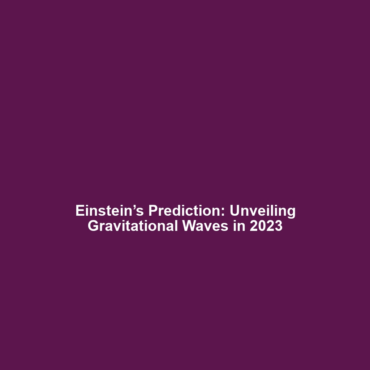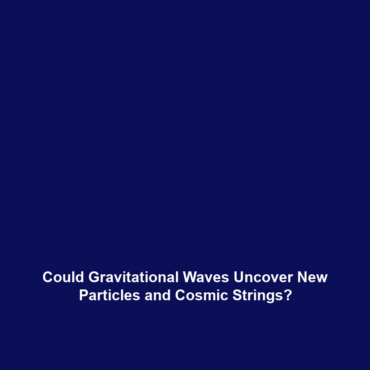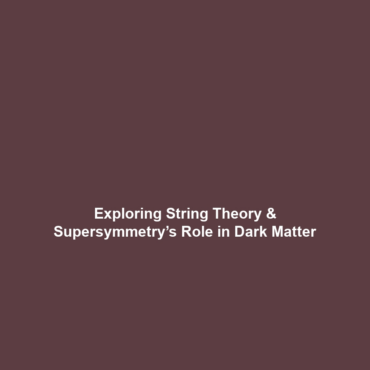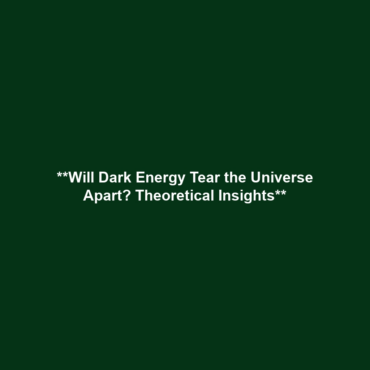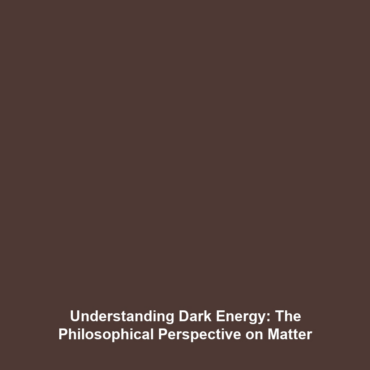Einstein’s Prediction: How General Relativity Predicted Gravitational Waves
Introduction
Einstein’s theory of General Relativity fundamentally transformed our understanding of gravity and space-time. Predicted over a century ago, the existence of gravitational waves—ripples in the fabric of space-time—has not only validated Einstein’s revolutionary ideas but has also opened new avenues for astronomical observation and scientific exploration. This article delves into the significance of Einstein’s prediction, examining how it fits into the broader context of gravitational waves and their implications for modern physics.
Key Concepts
General Relativity and Gravity
General Relativity, formulated by Albert Einstein in 1915, postulates that gravity is not a force but a curvature of space-time caused by mass. This groundbreaking shift enabled scientists to understand the universe in a novel way. Within this framework, gravitational waves emerge as fluctuations in space-time generated by the acceleration of massive bodies, such as merging black holes or neutron stars.
Predicting Gravitational Waves
The mathematical foundation laid by General Relativity predicted that energy generated by certain cosmic events would propagate through space-time as waves. These gravitational waves are a crucial aspect of the universe’s dynamics and provide a new method for observing phenomena that are otherwise invisible.
Applications and Real-World Uses
The realization of Einstein’s predictions has led to significant advances in various fields:
- Astronomy: Gravitational waves offer a new way to observe the universe, allowing astronomers to detect events like black hole collisions and neutron star mergers.
- Cosmology: These waves provide insights into the early universe and the formation of structures in space.
- Fundamental Physics: Studying gravitational waves enables tests of General Relativity in extreme conditions, enhancing our understanding of the laws of physics.
Current Challenges
The study and application of gravitational waves present several challenges:
- Detection Sensitivity: Current detectors are limited in their sensitivity, making it difficult to observe weaker signals from distant cosmic events.
- Data Overload: The volume of data produced by gravitational wave events can overwhelm existing data analysis methods.
- Theoretical Limitations: There are still unresolved questions regarding the full implications of black holes and neutron stars, which can affect predictions about gravitational waves.
Future Research and Innovations
Looking ahead, the field of gravitational wave astronomy is poised for remarkable advancements:
- Next-Generation Detectors: Projects like the Einstein Telescope and the Laser Interferometer Space Antenna (LISA) aim to enhance our ability to detect and analyze gravitational waves through improved sensitivity.
- Multi-Messenger Astronomy: Future research will incorporate gravitational wave observation alongside other forms of detection, such as electromagnetic signals, providing a more comprehensive view of cosmic events.
- Quantum Technology: Innovations in quantum sensors may revolutionize our approach to detecting and interpreting gravitational waves.
Conclusion
Einstein’s prediction of gravitational waves stands as a monumental achievement in the realm of physics, anchoring the significance of General Relativity. As we continue to explore the universe, the applications and research derived from gravitational waves promise to enhance our understanding of the cosmos. For more insightful content, explore our articles on gravitational wave applications and the future of astrophysics.
